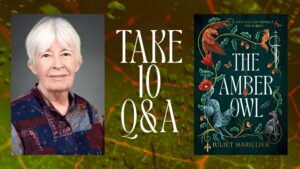Posts by Vaughn Roycroft
Back in May of 2022, I wrote an essay about my aspiration to have an audiobook version of my debut. I elaborated on what I thought made having an audiobook desirable, none of which has changed since. In looking back at the piece, I clearly recall what a distant aspiration it felt like. I didn’t know much about them then, and had only consumed a few of them. Producing and distributing one felt complicated and difficult. Not to mention expensive.
Against all odds, my seemingly distant goal shall soon be met. For the past few days I’ve been listening to a proof version of the soon-to-be-released audiobook of my debut. I couldn’t be more happier with it. Indeed, I’m even more determined to engage my fabulous narrator, Alex Wingfield, for books two and three.
I’m here to report that what seemed complicated, difficult, and expensive has turned out to be fairly straightforward, easier by far than I’d imagined, and… er—well, as the late great Meatloaf once asserted: two outta three ain’t bad.
Actually, I’ve discovered there are even ways to navigate the upfront investment. Although it’s not a route I chose to pursue, some narrators are even willing to work for a share of future profits. And, looking at sales figures, I’ve feel like calling it an investment is not merely a rosy euphemism for an expense.
Allow me to share my experience in the hopes that you, too, will be inspired to seek an audiobook. That is if you haven’t already.
The Meta Reasons
In my last audiobook article, I reported on the phenomenal growth of the category. If you were looking for a bunch of statistics, you found yourself reading the wrong guy. I mean, every regular reader knows I’m the SFF/Heartfelt/Occasionally Woo-Woo guy here at WU. Suffice to say—yup, the category is hot as ever, touting $9.8 billion in sales last year (that’s billion with a B). The projections only grow stronger, with an estimated compound annual growth rate of 26% over the next five years. If you’re at all interested in selling books, it’s a category that can’t be ignored.
Numbers aside, let’s face facts: A lot of Americans don’t read in print. Sadly, it’s a percentage that continues to grow. At the same time as audiobooks surge in popularity. I think we can safely presume a correlation. For many, the time and attention required of sitting and reading only grows scarcer. Heck, since I let it be known there will soon be an audiobook version of it, I’ve had more than a handful of friends and family members—each of whom presumably had a pretty strong interest in reading my work—express that they will finally be diving into the story I first published in October of 2022. Anecdotal, I know. But it tells me much.
My (Fairly) Straightforward Start
I mentioned my apprehension prior to pursuing an audio book. That’s partly due to the fact that I’ve accumulated more life experience outside of the internet than within it. More plainly said, I’m an old duffer who’s not all that tech-savvy. I have to admit, I struggled mightily in publishing the written version of my debut. I’ve made mistakes […]
Read MoreA week ago today, WU’s wonderfully wise resident Druid, Juliet Marillier, wrote an essay titled Small Good Things. The piece really spoke to me. Whether or not you’ve already read it, this bit from her opening bears repeating:
“Shadows loom large over the future. Louder, more aggressive voices threaten to silence our words of hope, courage, defiance, protest. At such times it’s all too easy for the small good things to be lost or dismissed in the face of our fear, our anxiety, our anger that this has come to pass. It’s all too easy for the writer to fall victim to despair.”
Damn, I can almost hear that as a narrative voice-over, delivered by Cate Blanchett as Galadriel, recapping my life over the past few weeks. It feels like the landscape has shifted underfoot. Simply carrying on feels like a quaint notion in a world that has so alarmingly unmasked itself. I’ve felt a strong lure to simply withdraw. Which reminds me that, as an aging, straight, white male, I’m quite privileged; so many folks from so many other demographics have no such option. Recognizing it makes me feel like continuing to use my voice is a duty. Writing is fundamental to who I am. But continuing to write now requires more than merely carrying on. In many ways it feels like starting over. To do my duty is to begin again.
Serendipitously, my current project is exactly that—starting over. While I wait for a cover image prior to the release of book three of my trilogy, I’m starting on book four. It’s a complete rewrite from scratch of my very first novel-length story, first begun almost two decades ago. I’m taking this as a sign, pointing me to the path that I hope will lead me through the dark, dystopian forest ahead.
I recently responded to a post on Twitter (I refuse to call it anything else, and I’ve mostly moved on to Bluesky), asking experienced writers for advice for an aspiring writer, seeking to make a start. My response seemed to resonate. Which reminded me that I need to heed my own council. Which I realized needed to be fortified beyond pithy aphorism.
Writing about what I’m grappling with is my best path to understanding and acceptance, so I thought I’d include all of you in the process. I don’t expect that any of this will feel all that fresh, but hopefully my thoughts will reinforce belief and reinvigorate practice as we all move forward. In that spirit, I’ll be using the terms “us” and “we” in reference to the advisee throughout.
Advice for Advanced Beginners
* Screens will not avail us! – If we’re going to make a solid start, we need to carve out some space and time. By that I don’t mean just hours in an empty room. I mean clear-headed time, free of distraction, allowing us to ruminate and compose, to reread and revise. And to hit finish points (more on these in a moment). I’m talking about more than cutting back on TV and doomscolling. We need to work on curbing the urge to check screens during our work time. The outrage machine is toxic to the health […]
Read MoreI’ve been noticing something about my current read. Something that stands in contrast to the majority of the dozen or so works of fiction I’ve finished reading this summer. I know you’ve seen the title, so I won’t dilly-dally in telling you that the story I’m referencing is deeply and richly layered. I’ll spare you the onion and parfait analogies that Shrek and Donkey have already belabored. What’s the book, you ask? Fortune’s Fool, by Angela Boord—a historical epic fantasy set in an Italianate world of feudal Houses, led by powerful competing families at a time when the introduction of firearms to their rivalries is changing everything.
The opening is lush with seamlessly woven detail in the world-building and character development, and yet the story’s setup feels straightforward enough. At first you might mistake it for a mere revenge tale. We experience the story via the first-person perspective of Kyrra d’Aliente—the daughter of one of the powerful Householders. Restless and rebellious as she comes of age, Kyrra allows herself to be seduced by the visiting son of the Aliente’s most ambitious rival family. When she finds herself with child and still out of wedlock, she’s pressured by her mother to dose herself to terminate the pregnancy—a “crime” seized upon by her family’s rivals. Kyrra is punished by disfigurement (a severed arm) and banishment to a nameless serfdom. Through adept nonlinear storytelling, we come to know Kyrra’s alter ego: Kyris di Nada—disguised as a male, and outfitted with a magical metal arm, Kyrra becomes a mercenary soldier, fighting in foreign wars.
Sounds layered already, doesn’t it? The book’s a chonker (770 pages) and I’m about 70% through. The prose is beautifully written and the pace is decidedly unhurried. Perfect, since I’m luxuriating in it–in no hurry to be done. I think we often conflate being slower with being less compelling. Not true here.
The steady, slow-burn pace of this book got me thinking about what so insistently compels my page-turning. I’ve decided it’s intrigue over the ongoing discovery of seemingly endless new layers. I want to know more about so many aspects of this story. There’s a smoldering love story between Kyrra and a mysterious fellow mercenary, who may or may not be the source of the magic that animates Kyrra’s metal arm, thereby imbuing her with that same magic. Better still, it’s unclear whether the magic is a boon or a curse. There’s political back-stabbing, double-agent duplicity, an interfering trickster god, a kidnapping with an occasionally willing hostage, and a quest wrapped up in an assassination plot, all contributing to a deepening mystery. I’m even sensing the makings of an unlikely found family. The further we go, the more we grasp that Kyrra is—and always has been—a pawn in the grand game of the powerful and ruthlessly ambitious Householders.
Every time I think I’ve got a handle on all of the story elements Boord has me juggling, she tosses me another. Yes, it’s challenging. And yes, it’s compelling, thought-provoking, and inspiring. And fun!
Stuff Happens
I said that Fortune’s Fool stands in contrast to much of the crop of my summer reads, which is not to say I didn’t enjoy any of […]
Read MoreHere’s something I didn’t realize when I started writing: Most people dislike the Chosen One trope. Not everyone dislikes it, of course. And I’d say some who claim to dislike it are generalizing. I mean, how would we have ended up with so many hugely popular Chosen One stories and franchises if everyone hated them as much as they profess? And I do mean huge—stuff like: Star Wars, Harry Potter, Percy Jackson, The Matix, Dune, The Wheel of Time, and—of course—The Lord of the Rings (didn’t think I was going to neglect to mention that one, did you?).
Generalizations aside, the consensus seems to be that the Chosen One is worn out, tired, passé. In my genre (SFF) it’s become the trope most likely to induce eye-rolls or groans, or even a “hard pass” (don’t ask how I know).
So what did I do? Went ahead and wrote six manuscripts that prominently feature this often disdained trope, of course. I may have been clueless about folks’ feelings in regard to the Chosen One, but luckily, I was also clueless about what I was trying to accomplish with it. Turns out, my explorations have been enlightening. For me, anyway. Hopefully for some readers, too. I really don’t have any regrets, and I still consider the trope a viable tool.
As with all of the elements of storytelling, I believe its viability depends on how it’s used. Shall we take a closer look?
Why the Scorn?
It’s not difficult to guess why folks dislike the trope, but I did some googling anyway. Seems the most frequently cited reason is its predictability. Followed closely by how the circumstance might lead to a lack of obstacles for the character. It’s obviously very old—in books, going back to the earliest versions of King Arthur, at least—which can lead to feelings of overfamiliarity.
Then there’s the Chosen One characters themselves. Being chosen can tend to result in Mary Sues or Gary Stus—characters who are too perfect, or annoyingly “special.” If the Chosen One is “destined,” they can be stripped of their freewill. Even the type of obstacles Chosen Ones face can be tedious, especially when the chosen character is ill-equipped or misinformed. The very presence of an enhancement that sets Chosen Ones apart can lead to instances of Deus Ex Machina.
All of these complaints stem from a story pattern that’s formulaic. I’d also argue that all of them are easily avoidable.
Choice? What Choice?
I didn’t fully appreciate it then, but on the day I first started typing the pages that eventually developed into my epic fantasy series, I had already chosen to utilize the Chosen One trope. In my earliest recollections of the lead characters, they were—in some fashion—chosen to lead. In other words, although I didn’t consciously seek to write to a trope, I did indeed choose characters who were chosen.
That was twenty years ago, and I’m not sure the eye-rolling and groaning over Chosen Ones had become quite so universal yet. It’s true that I was greatly inspired by The Lord of the Rings, and that I also consider Dune to be a foundational book. Plus, I have been a Star Wars geek since standing in line for the first theater runs of the first […]
Read MoreThe question should’ve been easy to answer and yet it left me thinking for days. Writing this post was my way of sorting it out. I blame Terah Shelton Harris, and her thought-provoking essay here on WU earlier this month. In which she asked, “What’s your definition of success?” In the essay, Terah describes being taken aback when she was asked whether she considered her recent debut to be a success. Evidently I can relate!
In the piece, Terah reveals that she’d once thought that success would include some tangible, public accolade, such as making a list, and cites the NY Times bestseller list as an example. She rightfully points out that lofty lists like that are beyond reach for the vast majority of books and authors. The realization incited her search for a new definition. She sought the opinions of two writing friends as to how they define success. Among the measurable and tangible aspects of success mentioned in the piece were: simply finishing a book; getting it published; getting it into the hands of readers; having people pay to read one’s thoughts; and achieving sales that might provide for ongoing writing and publishing.
I related to each and every point made. I once shared some version of each of their listed definitions. Until I didn’t.
My Moving Goalposts
Terah mentions in the piece that her early goals were narrowly focused on finishing a book and then on getting it published. Moreover, that throughout her journey she’d continued to move the goalposts for defining success. I’m guilty of that, too. I spent years focused on getting my work published, and I’m glad for it. I don’t think I would have been able to work so hard and so diligently over such a lengthy period without imagining that a traditional publishing deal would be my way of sailing through the goalposts. I think I needed to aim for a tangible achievement—something I could point to in claiming my success. As much as I professed an understanding that a pub deal wouldn’t be a finish line, I wanted a finish line. The validation that I imagined would come with it was central to the pursuit. For those of you who aren’t aware, at the end of my long drive, my game-winning attempt flew astray of that particular set of goalposts. It felt more like the end of a season than the end of a game.
Friends, I have hoisted and relocated my goalposts so many times since then. After deciding to withdraw from seeking a traditional deal, I promptly set up new goalposts in the self-pub arena. There have been as many goalpost placements as there have been attempts gone astray. I’ll summarize my self-publication era by saying that I ended up learning something that I’ve mentioned here on WU before—I don’t do well with tracking sales and ratings. It demoralizes me and saps my writing momentum. In other words, I no longer track, or even check, my stats. Which contributes to another weak facet of my self-pub game—marketing myself and my books.
I do what I can to maintain my visibility in the SFF book community, and the things I’ve discovered that feel right are: supporting […]
Read MoreThis month there are two converging forces in my life. Different as they are, there are some interesting similarities between them. I suspect there are lessons to be found in examining their convergence. Lessons that apply to my work and my life as a writer. The first item is a final pass through book three of my epic fantasy trilogy prior to being sent for proofreading for its release. The second is a surprising development in the NFL playoffs. That’s right, I’m comparing the climax of an epic fantasy story and a season of present-day pro athletics.
So what do they have in common? Well, imagine a once proud city, formerly the shining gem of an empire—one of the richest and most architecturally advanced cities on earth—fallen on hard times, all but abandoned, not just by the realm but by the captains of the industry that made it what it had once been and whose failings had contributed to its downfall.
Now imagine a ragtag group of scrappy warriors seizing control of the grand palace at the center of the once shining city. Imagine the warriors holding dear their memories of a storied past. Imagine them led by someone who is mocked by the other leaders of the region. Imagine the city besieged, surrounded by those who consider it beneath contempt. Imagine those selected to subdue the besieged warriors are a force that everyone considers unstoppable. Only those who are trapped in the city have a modicum of belief that they can somehow survive the coming onslaught.
Now imagine the scrappy warriors, in the face of such overwhelming odds, having the audacity to call themselves lions, to think of themselves as #OnePride, and to embrace a comportment that’s #AllGrit.
A few of you have guessed that I’m referencing the Amalus Clan Lions led by Vahldan, conqueror of Thrakius. But without the featured image above, how many of you would’ve guessed that I’m also referring to the NFC North Division Champion Detroit Lions, led by Coach Dan Campbell, biter of kneecaps?
Me, Detroit, and the Lions
I’m obviously stretching the similarities. There are many differences between the Detroit Lions and the characters in my trilogy. But their coinciding circumstances have gotten me thinking about underdogs. Since WU is a hail-Mary heave from being a sports-centric site, we’d better start with some backstory.
For those who aren’t familiar with pro football history, the Lions have long been considered a doormat in the league. They are one of four teams—and the most recent—in NFL history to have a winless season. Till this season, they hadn’t won their division in decades. Until a little over a week ago, they hadn’t won a playoff game in 32 years. In football circles and among NFL pundits the team has long been a laughingstock. Slurs like Toothless Lions, the Detroit Lie-downs, and references to being S.O.L. (Same Old Lions) have long been commonplace.
Although I grew up in a smaller Michigan city that’s a two-hour drive from downtown Detroit, my life is deeply entwined with the city. Just as the entire state has long been deeply entwined with the auto industry, including my hometown—a Fisher Body plant having once been its second largest employer. On a personal level, my mother spent […]
Read MoreDid you catch Kathleen McCleary’s wonderful post here on WU last Wednesday? It’s about the healing power of writing and it’s just plain awesome, so if you haven’t yet you should now. It’s titled Writing Your Way Whole, and in it she describes her feelings about her WIP, writing:
“This is the book I’m writing for me, and I see myself growing and changing as I write, as my characters grow and change. They are nothing like me and they are completely autobiographical. It’s a wonder.”
It’s a delightful quote, for various reasons. But in particular I was caught by the term, “wonder.” I used it myself in a recent interview, about the feeling I had during the heady days of first venturing into the storytelling wilderness on my writing journey. It feels like an appropriate time of the year to discuss wonder, as I consider it a gift to writers—something we should all continue to actively seek.
As we do in cases like this, let’s start with a definition:
Wonder—a feeling of surprise mingled with admiration, caused by something beautiful, unexpected, unfamiliar, or inexplicable.
Now that’s a lovely collection of words, isn’t it? Surprise, admiration, beauty, unexpectedness…even inexplicability (at least sometimes)—they’re all things we seek to achieve when we’re writing, aren’t they?
Let’s seek some winter wonder here together, shall we?
Nature—The Go-To Source
Late last month my wife and I celebrated an anniversary. It was 20 years ago that we sold our business and moved fulltime to what was then our getaway cottage. Which means that it’s currently the time of the year I experienced during the days and weeks after moving here. We live in a summer resort area. Due to climate change and the aftereffects of the pandemic, it’s not quite the same as it was then—specifically, the region is not quite as wintry and is populated with noticeably more fulltime residents. But it’s still pretty darn cold and quiet. Now as then, if you’re wearing the right gear, it’s cozy and peaceful.
I remember coming to appreciate how I could bundle up and take daily walks through the woods and along the shore and rarely see another human. I remember first hearing the pines that line the top of the dunes “singing” in the wind off of the lake. I still relish the tang of the needles underfoot, the sting of the cold blast as I crest the last ridge at the waterfront. There’s something profound in the solitude. Being alone in nature feels like it contains all of the ages of mankind, as though anyone in any era could be experiencing it right there alongside me.
I love traveling and exploring the natural world in new places. New vistas are always good for a jolt of wonder. But there’s so much to appreciate every day, right here. Within walking distance, we have not just an ever-changing Great Lakes shoreline. We also have aging forests, with a few gigantic oaks that have stood since the Civil War. We have a majestic stand of red pines planted by the Civil Conservation Corps during the Great Depression, as part of a dunes protection program (it worked!). Speaking of dunes, some of ours are towering slopes, and have been known to swallow entire boats in […]
Read MoreIt’s been five years since I posted the last essay here in which I ask why I put myself though the topsy-turvy pursuit of writing fiction. As I said then, I find the process worthy of reexamining because the answers inevitably change. It’s never been truer than it is now, coming up on the one-year anniversary of the publication of my debut. Which means that this time I need to ask myself not just why I’m still writing, but why I should bother to continue my publication journey.
Since it’s occupied most of my attention over the last couple of years, I’ll start with publishing.
My Pub Position
Besides propped at the end of the bar nursing a pint, what is my pub position? For anyone who might be new around here, I should probably start with a brief overview. I write epic fantasy. I worked for over a decade on a trilogy, of which the first edition was my debut. After pursuing a traditional deal for several years, I decided to self-publish. I’d initially planned on having all three books published within a year. That obviously hasn’t happened. There are a variety of reasons for the delay in book two’s arrival, which I’ll leave for another post. The second and third books should appear in fairly short succession, but I’ve learned to not make predictions. Well, not public ones, anyway.
For an overview of the marketplace, mine was one of over four million titles to release in 2022, a year during which book sales were down about 4.5%. The growth of self-publishing has led to an unprecedented number of new books, and the latest tools and resources provide those of us who choose the path with an unprecedented means to offer a quality product. I’m very pleased with the physical quality of my offering. It is far from alone in a sea of gorgeous, enticing fantasy releases.
Beyond having a beautiful book in a sea of beautiful books, how am I doing? I’m going to be totally honest here and say that I don’t know—not exactly. I’ve learned that keeping track of sales data is harmful to my mental health. Doing so undeniably impedes my ability to make progress with anything writing-related. I find anything involving comparison to be particularly adverse to the creative process. Meanwhile, not keeping track of sales data is hardly an astute business practice. There are indicators that can’t be ignored, of course. For example, I have been stunned by the number of you—WU contributors and regulars—who bought, read, reviewed, reached out, and/or recommended my debut. Your support has been phenomenal, and my gratitude is immense and undiminished.
Stepping outside of WU, I have found the SFF self-pub community—avid readers, reviewers, and fellow authors alike—to be warm and inclusive. I’ve met many wonderful folks, and have received no small amount of enthusiastic support. In terms of harnessing support, I can see that the more one invests of themselves, the better they do. For me, online interaction poses a challenge. Too much is definitely not a healthy proposition. Too little, even over short periods, results in swiftly fading from the community’s awareness.
I’ve been seeking my own version of balance. Unfortunately, what feels like balance to […]
Read MoreBorn as: Sinéad Marie Bernadette O’Connor
By way of: The Universe Inside You (& Me)
Dear Sinéad,
I hope you don’t mind me calling you by the name I’ve always known you by. I doubt you’ll remember me, but we were actually friends once. That is, if Facebook friendship counts. Yep, back in 2009 (I think), when I first joined the platform, I was so clueless that I actually sent you a friend request. Astonishingly, you accepted! You were among my first friends there, and were kind enough to respond to my missives on several occasions. Then again, who here on this plain can know? Maybe remembering is an obsolete concept to you now.
Whether or not you remember, I’ll remind you that I’ve been a huge fan since the first album. My admiration for you as an artist has only ever grown. I want you to know that I don’t ordinarily do this—write letters to those beyond the veil. I hope you take it as the compliment intended when I tell you that I’ve only written one other, to Professor Tolkien—my first inspiration, and the wellspring of my chosen literary genre.
I’ve been thinking about you a lot lately, and I thought it might help me to make peace with your passing to write you and let you know why you continue to mean so much to me. I recently watched the documentary, Nothing Compares, and I’m glad it was made before your passing. It was wonderful to hear your voice during this retrospective on your remarkable artistic journey. It feels different than a posthumous tribute–less fawning and pretentious–which seems fitting for someone like you. I’m going to encourage everyone who’s interested in living an artist’s life to watch it.
If I’m going to address things I admire, and that inspired me, I have to start with your fearlessness. I mean, damn girl—talk about speaking your truth and never faltering. Heck, you were cancelled before being cancelled was a thing. Shortly after the incident on SNL, when you got on the stage at Madison Square Garden and were booed, not only did you stand up to it, you switched from the soft song you were going to sing to belt out a Bob Marley anti-racism song, just to make sure you were heard over those who sought to drown out your voice. Talk about a badass! What were you, 23 at the time? It had to sting. Most would’ve fled the stage, I’m guessing myself included. But you simply considered it the price of staying true to yourself and carried on. Years later you said you never regretted it. You didn’t give a damn about the fame and the money that it might have cost you. You cared about the message and the art and the conversation it incited. You cared about the people who’d been harmed. You cared about the truth.
Which brings me to your perseverance and adaptability. As you surely realize, you never had another top 40 hit in the US afterward. But, oh, how you endured. You always insisted that you never wanted to be a pop star. […]
Read MoreI was recently invited to speak at an event called Author! Author! It was held in the newly remodeled and rejuvenated library at a nearby community center. The session seemed to strike a resonant chord, so I thought I’d share my speech with my fellow WUers, in the hopes of extending the good vibes.
Why the Fantasy Nerd?
You might be wondering why a fantasy nerd like me is here talking to you today. I guess the most obvious reason is that I live nearby and I recently released my debut—an epic fantasy story which is the first installment of a trilogy.
When Lorraine [the center’s director] first invited me, we discussed how I might talk about the inspirations for my books and my writing journey. And since my books are inspired by actual history—specifically the history of the culture clash between the Goths and the Romans—I thought: “That’s great! I can talk about Goths and Romans for hours.”
Please don’t worry. And please, nobody leave. As delighted as I’m sure you would be to listen to an ancient history lecture, I’m going to spare you that outcome. Which brings me to…
What I’d Really Like to Talk About:
Although the topic I chose isn’t history, it is something that’s central to my inspiration and to my writing journey. It has to do with a discovery I made about myself many years ago. At a fairly young age, I discovered I have an ability. It’s something for which we all have potential, although it takes practice to make it a part of our routine. I believe it’s worth the effort. Regularly using this ability has documented health benefits, and I believe it makes our lives richer. I also believe that the more widespread it becomes, the better off our world will be.
Sounds pretty good, doesn’t it?
So what is this mysterious ability? It’s the ability to immerse ourselves in fictional stories. Now you might be wondering why would I bother to spend my allotted time talking about immersion in fiction. After all, at an event called “Author, Author,” there’s bound to be an element of preaching to the choir, right? That may be true, but if you can’t get the choir to spread the good word, who can you get? Honestly, I believe it’s a critical issue, and one that is terribly underdiscussed. I’ve come to believe that we should be talking about it wherever and whenever we can. And I believe that’s true now more than ever.
It might sound dramatic to say now more than ever, but… well… Do any of you get those weekly notifications on your phones? Mine come on Sunday mornings. My phone tells me whether my screen-time is up or down. Are you like me?—when it says, “Your screen-time was down 16% in the past week,” do you feel just a little smug about it? I do. That is until I open my iPad and it says: “Your screen-time was up by 16%.”
Anyway, my point is that we need immersion in fiction now more than ever because of how daunting it’s becoming to achieve it. Look, I’m as guilty as anyone. It can be tough to get there. As we’ve become […]
Read More





















